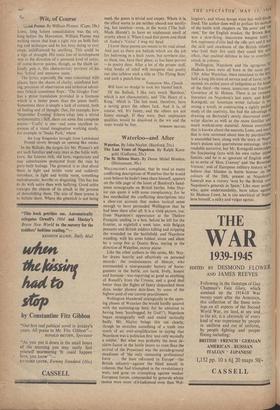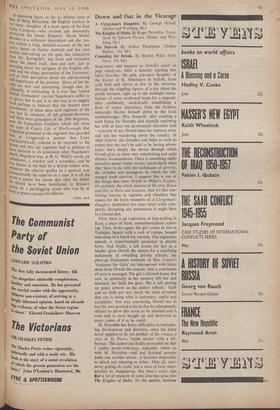Waterloo—and After
Waterloo. By John Naylor. (Batsford, 21s.)
The Last Years of Napoleon. By Ralph Korn- gold. (Gollancz, 25s.)
The St. Helena Story. By Dame Mabel Brookes. (Heinemann, 30s.)
WELLINGTON'S complaint, that he read so many conflicting descriptions of Waterloo that he would
soon believe he hadn't been there himself, appears on the title page of the latest of Batsford's hand- some monographs on British battles. John Nay- lor can quote it with some complacency, for he has marshalled the conflicting descriptions into a clear-cut account that makes tactical sense enough to have persuaded Wellington that he had been there after all. It is a vivid picture, too, from Napoleon's appearance at the Theatre Francais, smiling in a box, before he left for the frontier, to nightfall a week later, with Belgian peasants and British soldiers killing and stripping
the wounded on the battlefield, and Napoleon standing, with his arms folded, alone and silent by a camp fire at Quatre Bras, staring in the direction of Waterloo, 'name plaine.
Like the other authors in this series, Mr. Nay- lor draws heavily and effectively on personal records: the reminiscences of Mercer, who commanded a nine-pounder battery of horse- gunners in the battle, are lucid, lively, honest
and humane—:war-reporting as good as anything of Russell's from the Crimea, and a good deal better than the flights of fancy dispatched these days, under phoney date-lines, by some of the highest-paid of our current practitioners.
Wellington blundered strategically in the open- ing phases of Waterloo (he would hardly quarrel with the summing-up here, for he admitted to having been `humbugged, by God !'); Napoleon began strategically well and ended tactically badly. Mr. Naylor brings this out clearly, though he stretches something of a truth into much of an over-simplification in saying that Napoleon was a politician first `and only secondly a soldier.' But what was probably the most de- cisive factor in the battle (more so even than the arrival of the Prussians) was the parade-ground steadiness of `the only remaining professional force . . . the least reformed in Europe'—the British infantry—against the blind assault in columns that had triumphed in the revolutionary wars, and gone on triumphing against weaker European forces, commanded by generals whoSe tactics were more olf-fashioned even than Wel-
lington's, and whose troops were less well-disciP' lined. The author does well to preface his account of the battle with chapters on 'the arms' and the men,' for the English musket, the Brown I3ess' was a slow-firing, inaccurate weapon (onlY 3 few regiments d'elite had the rifle yet) and it ols the skill and steadiness of the British infantry. who held their fire until they could fire With' effect, that enabled defence in line to overthro. attack in column.
Wellington, Napoleon and the egregious 51' Hudson Lowe were all born in the same year' 1769. After Waterloo, there remained to the first, half a long life-time of service and of fame; to tile second, six exiled years of indignities at the hains of the third—the mean, suspicious and fractiots Governor of St. Helena. There is an immerne literature on Napoleon's last years, and RalPh Korngold, an American writer (scholar is tod strong a word), in constructing a tightly packed study of the captivity, has had the advantage of drawing on Bertrand's newly discovered mar° script diaries as well as the more familiar and much worked-over material. Almost everything that is known about the neurotic Lowe, and much that is now surmised about him by psychiatrists, is assembled here, along with the story of NaP°' leon's jealous and quarrelsome entourage. into 3 readable narrative, but Mr. Korngold embroiders the fascinating facts with his own rather jejure fancies, and he is so ignorant of English usage as to write of 'Hon. Creevey' and 'the Reverend Vernon,' and of European military history as Id believe that Minden (a battle honour on the colours of the 20th, present at Napoleon funeral) was a victory 'won by the British aver Napoleon's generals in Spain.' Like most peaPle who, quite understandably, have taken against Sir Hudson Lowe, he is too uncritical of Nalin" leon himself, a sulky and vulgar egotist. A charming figure in the St. Helena story is that of Betsy Balcombe, the English tomboy in her teens—daughter of a local agent of the East India Company—who amused and innocently distracted the lonely EMperor. Dame Mabel Brookes is a collateral descendant and she, too, has written a long, detailed account of the last Years, based on family material and her own tireless note-taking on the spot, less exhaustive than Mr. Korngold's, but fresh and evocative about the island itself, then and now; just as damning about the intrigues of the English offi- cials and the dingy personality of the Governor; and as little perceptive about the self-deceiving self-importance of his prisoner. Many of her de- . tails are new and interesting, though one, in- cidentally, is misleading. It is true that 'twelve British Grenadiers' carried Napoleon's coffin to its grave, but to put it in this way is to suggest (and perhaps to believe) that the bearers were gnardsmen: in those days each regiment of the line had its company of tall grenade-throwers, and these were grenadiers of the 20th Regiment, now the Lancashire Fusiliers, which still owns the copy of Coxe's Life of Marlborough that .aPolenn presented to the regiment that guarded hi at Longwood—a present that Lowe characteristically ordered to be returned to the have and that the regiment had to petition to nave restored to its possession after Napoleon's death. Napoleon was, in H. G. Wells's words, an adventurer, a wrecker and a scoundrel, and he Was beaten in the field by a British soldier who, .whatever his relative quality as a general, was "measurably his superior as a man. It is all the More a
he matter for shame that after his defeat
should have been humiliated, in Britain's 1",karne, by a pettifogging tyrant who was by at 'east as great a margin his inferior.
CYRIL RAY





































 Previous page
Previous page